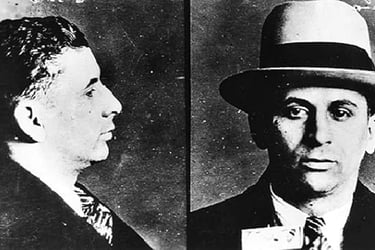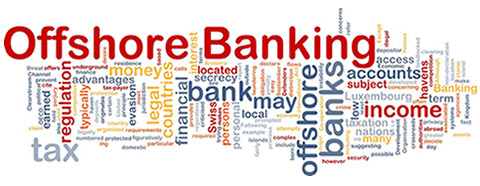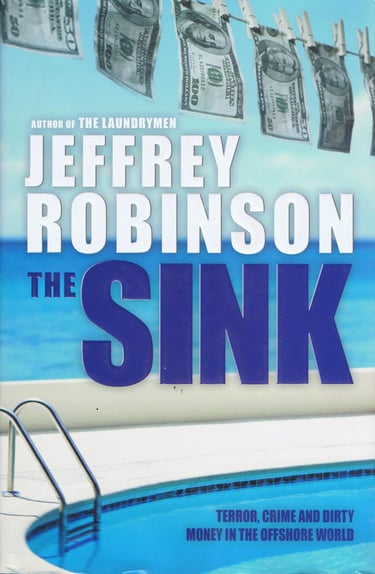The paradise islands of the Caribbean hide some ugly secrets — and some very dirty financial dealings. Following in the footsteps of two previous international bestsellers – The Laundrymen and The Merger – Jeffrey Robinson brings the story of dirty money full circle, back to the Caribbean islands where the business of crime does its banking.
In 1994, when Jeffrey Robinson, author of The Laundrymen, first brought to the world's attention the problems of dirty money - revealing how otherwise legitimate lawyers, bankers, accountants and even governments were helping drug traffickers hide the proceeds of their crimes - he labeled money laundering the world's third largest business, estimating that at any given time there was around $300 Billion circling the globe, looking to get clean
Now, following in the footsteps of two previous international bestsellers - The Laundrymen and The Merger - Jeffrey Robinson brings the story of dirty money full circle, back to the offshore islands in paradise where the business of crime does its banking.
He calculates that the dirty money business has doubled in under ten years and has become so sophisticated that law enforcement and concerned governments flounder in its wake. He lays blame on the offshore world.
An eye-opening tour de force of investigative journalism, Robinson reveals the state of the art of business-as-crime worldwide. He lifts the lid on the lawyers, bankers, accountants, company formation agents, CEOs, and despots who have created - and who actively sustain - a world of window-dressing regulations where criminals and corporate giants live side by side, and by the same rules, beyond the reach of governments and the law.
The Guardian: "A lively anecdotal guide to the laundry business and related scams extending from cable piracy to internet casinos, pyramid selling, telemarketing fraud, disguised loans, kickbacks, false end-user certificates for everything from cigarettes to arms, to something called death-spiraling, a scheme devised to run a company's share price into the ground while selling to mug punters."
Quill and Quire: "Jeffrey Robinson’s The Sink is a follow-up to his 1996 bestseller The Laundrymen, which looked at the bankers, accountants, and other seemingly upstanding functionaries who aid and abet a multi-trillion-dollar dirty economy that ranks second only to foreign exchange and oil in terms of revenue. Dirty money – whether it’s stolen by African despots from the treasuries of their own countries, or profits of Colombian drug cartels, or mafia “earnings” – needs to be clean in order to escape detection. That’s where sinks – offshore havens for dirty money with little regulation and lots of privacy – come in. The Swiss banking gnomes used to do it best, but they’ve got stiff competition these days, as Robinson proves with an exhaustive list of mostly island nations – Antigua, Bahamas, Curaçao, Grenada, Dominica, to name just a few – who sell banking secrecy for a modest commission.
"Through dozens of examples, Robinson gives readers the nuts and bolts of how swindlers, crooks, and charlatans register legitimate-sounding banks or trust companies through which they funnel their own ill-gotten-gains. The money isn’t taxed – one of the prime reasons offshore banks were created in the first place – and the dirty money can be thrown in with the clean because the shell banks, which consist of little more than an answering machine and a plaque on the wall, have “correspondent” relationships with legitimate other banks around the world.
"Robinson isn’t just railing against the bad guys. He takes the authorities to task for their often lax attitude toward money laundering and fraud. He also points out that money laundering is also an integral part of terrorism funding. The events of Sept. 11 should hopefully remind authorities of the shadowy connections between dirty money, white-collar crime, and terrorist activity."
Director Magazine: "This is a book to give Western governments nightmares... with a global backdrop and a huge cast of villains, Robinson’s book contains the stuff of a dozen Bond-type blockbusters. The trouble is, it’s not fiction."
Management Today: "A frightening read for those who believe in the sanctity and security of the banking system...a sordid tale of tax evasion, drug money, organized crime and terrorism walking side-by-side with lawyers, accountants, banks and governments."
Time Out: “Robinson explains carefully and engagingly how and why money is hidden behind the names of non-existent corporations in barely plausible countries.”
Meyer Lansky: "If the Feds can't find it, they can't tax it."




